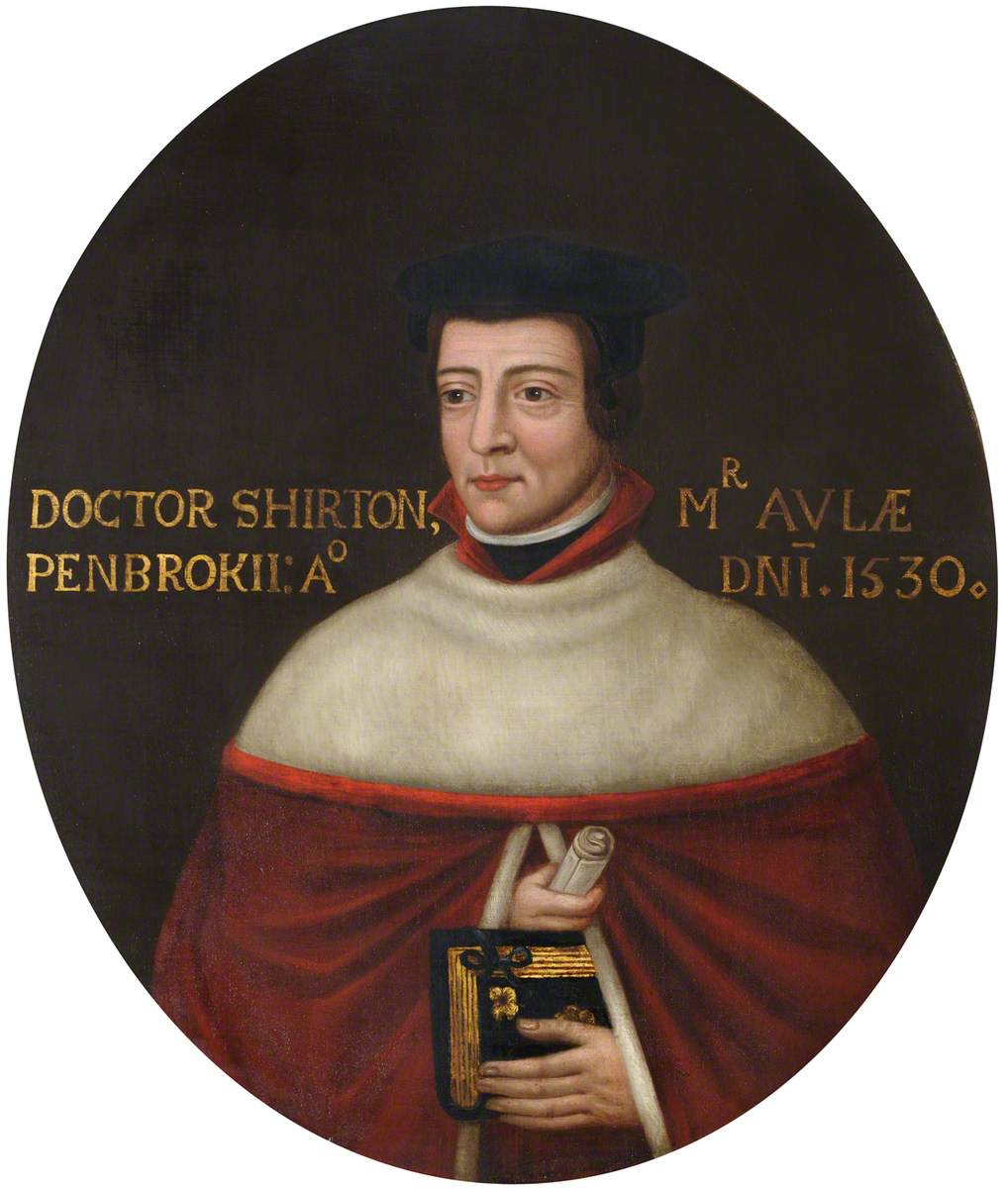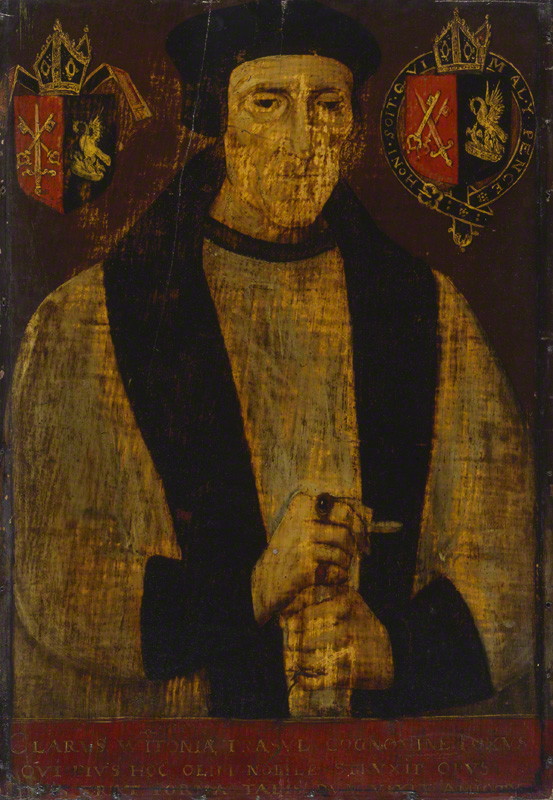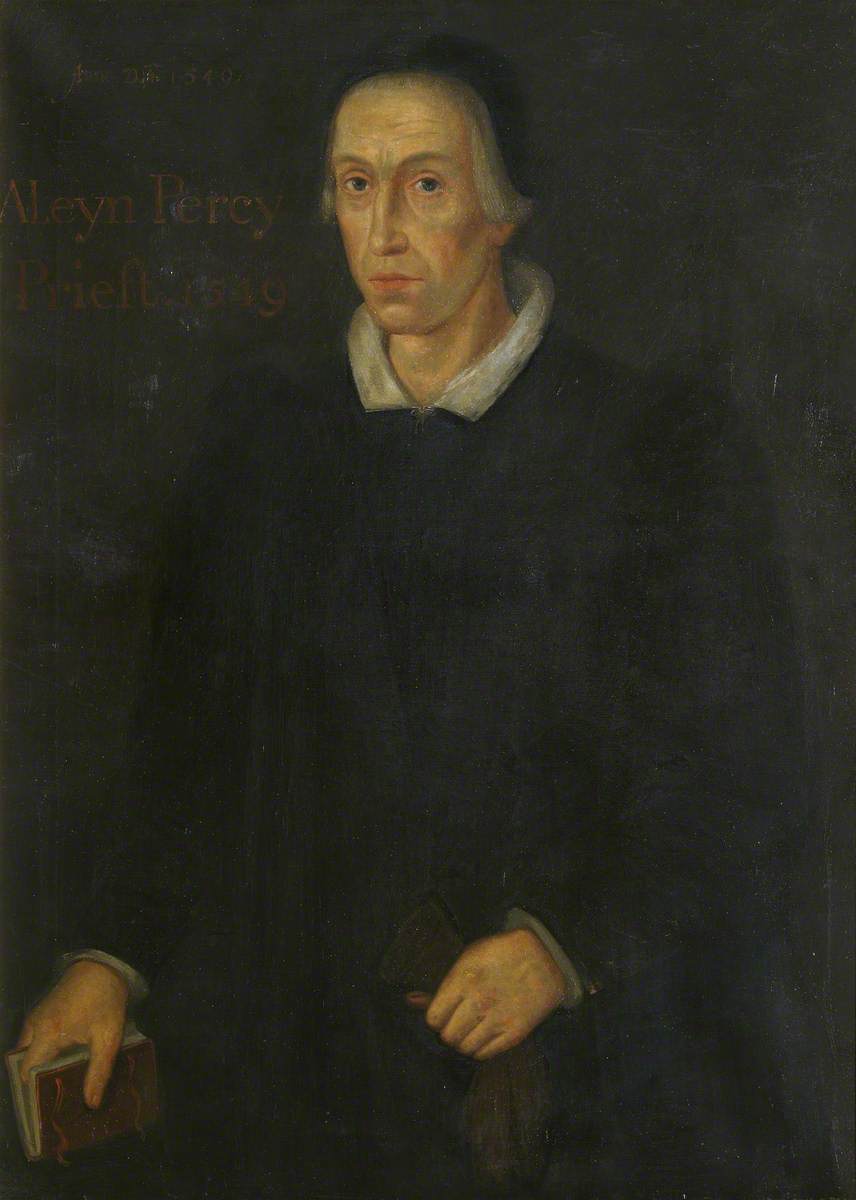|
Robert Shorton
Robert Shorton (died 17 October 1535) was an English churchman and academic, first Master of St John's College, Cambridge and Archdeacon of Bath. Life He was one of the earliest scholars of Jesus College, Cambridge. He graduated B.A. in 1501 and M.A. in 1503, and was elected fellow of Pembroke Hall on 24 November 1505. In 1507 he was chosen to preach before the university, and in 1509 graduated B.D., and was selected to read the divinity lecture instituted by Lord Chief Justice William Hussey. On 9 April 1511 he was appointed the first Master of St. John's College, newly founded by Lady Margaret Beaufort. Shorton superintended the progress of the work of building the college, resigning his office before 1517. He was already dean of the chapel to Thomas Wolsey, and through Wolsey's influence he received preferment. On 1 November 1517 he obtained the prebend of Donnington in the diocese of York, which on 7 May 1523 he exchanged for that of Fridaythorpe in the same see. In October 1 ... [...More Info...] [...Related Items...] OR: [Wikipedia] [Google] [Baidu] |
Stoke-by-Clare
Stoke-by-Clare is a small village and civil parish in Suffolk located in the valley of the River Stour, about two miles west of Clare. In 1124 Richard de Clare, 1st Earl of Hertford, moved the Benedictine Priory that had been established at his castle in Clare to Stoke-by-Clare. The Priory, which was controlled by the monastery of Bec in Normandy, enjoyed by 1291 rents from 17 parishes in Suffolk. During the Hundred Years' War the Prior's revenues were in part diverted to the English crown and in 1415 the Priory was replaced by Stoke College, intended to support a small community of priests and choristers under the patronage of Edmund Mortimer, 5th Earl of March, who was also buried here. The village is home to the Elwes Baronetcy which was created in 1660 by King Charles II for Gervase Elwes, Member of Parliament for Sudbury and Suffolk. At the time of the English Reformation, the Dean of the college was Matthew Parker. Under his authority the College became a centre ... [...More Info...] [...Related Items...] OR: [Wikipedia] [Google] [Baidu] |
Canons Of Windsor
The Dean and Canons of Windsor are the ecclesiastical body of St George's Chapel at Windsor Castle. Foundation The college of canons was established in 1348 by Letters Patent of King Edward III. It was formally constituted on the feast of St Andrew the Apostle, 30 November 1352, when the statutes drawn up by William Edington, bishop of Winchester, as papal delegate, were solemnly delivered to William Mugge, the warden of the college. Accepting that the process of foundation took several years to complete, the college takes the year 1348 as its formal date of foundation. Costume Three ancient monumental brasses survive depicting canons of Windsor, wearing the mantle of the Order of the Garter, purple in colour, with a circular badge on the left shoulder, displaying: ''Argent, a cross gules'' (a Saint George's Cross): #c. 1370. Roger Parkers, North Stoke, Oxfordshire (half effigy with inscription; head lost). #1540. Roger Lupton, LL.D., Provost of Eton College and Canon o ... [...More Info...] [...Related Items...] OR: [Wikipedia] [Google] [Baidu] |
Archdeacons Of Bath
The Archdeacon of Bath is a senior ecclesiastical officer in the Church of England Diocese of Bath and Wells. The post, having oversight over the archdeaconry of Bath, has existed since the twelfth century. The archdeaconry includes five deaneries. List of archdeacons :''Some archdeacons without territorial titles are recorded from around 1086; see Archdeacon of Wells.'' High Medieval *bef. 1100–aft. 1120: Gerbert *bef. July 1141–aft. 1154: Martin *aft. 1154–aft. 1165: Thomas ''(I)'' *: Baldwin *–bef. 1176: John Comyn *bef. 1182–aft. 1206: Peter of Blois (also Archdeacon of London from 1202) *–aft. 1212: John of Colchester (disputed) *bef. 1214– (d.): Hugh of Wells *–aft. 1236: Nicholas de Neville *bef. 1238–aft. 1246: Henry Tessun *bef. 1247–aft. 1248: Nicholas Tessun *bef. 1257–1257 (res.): Robert de Chauncy (afterwards Bishop of Carlisle) *bef. 1259–1259 (res.): John de Cheam (afterwards Bishop of Glasgow) *bef. 1264–aft. 1266: Walter de Me ... [...More Info...] [...Related Items...] OR: [Wikipedia] [Google] [Baidu] |
Masters Of Pembroke College, Cambridge
Master or masters may refer to: Ranks or titles * Ascended master, a term used in the Theosophical religious tradition to refer to spiritually enlightened beings who in past incarnations were ordinary humans *Grandmaster (chess), National Master, International Master, FIDE Master, Candidate Master, all ranks of chess player *Grandmaster (martial arts) or Master, an honorary title * Grand master (order), a title denoting the head of an order or knighthood *Grand Master (Freemasonry), the head of a Grand Lodge and the highest rank of a Masonic organization *Maestro, an orchestral conductor, or the master within some other musical discipline *Master, a title of Jesus in the New Testament *Master or shipmaster, the sea captain of a merchant vessel *Master (college), head of a college *Master (form of address), an English honorific for boys and young men *Master (judiciary), a judicial official in the courts of common law jurisdictions *Master mariner, a licensed mariner who is qualif ... [...More Info...] [...Related Items...] OR: [Wikipedia] [Google] [Baidu] |
Masters Of St John's College, Cambridge
Master or masters may refer to: Ranks or titles * Ascended master, a term used in the Theosophical religious tradition to refer to spiritually enlightened beings who in past incarnations were ordinary humans * Grandmaster (chess), National Master, International Master, FIDE Master, Candidate Master, all ranks of chess player *Grandmaster (martial arts) or Master, an honorary title * Grand master (order), a title denoting the head of an order or knighthood *Grand Master (Freemasonry), the head of a Grand Lodge and the highest rank of a Masonic organization *Maestro, an orchestral conductor, or the master within some other musical discipline *Master, a title of Jesus in the New Testament *Master or shipmaster, the sea captain of a merchant vessel * Master (college), head of a college * Master (form of address), an English honorific for boys and young men *Master (judiciary), a judicial official in the courts of common law jurisdictions *Master mariner, a licensed mariner who is qu ... [...More Info...] [...Related Items...] OR: [Wikipedia] [Google] [Baidu] |
1535 Deaths
__NOTOC__ Year 1535 ( MDXXXV) was a common year starting on Friday (link will display the full calendar) of the Julian calendar. Events January–June * January 18 – Lima, Peru, is founded by Francisco Pizarro, as '' Ciudad de los Reyes''. * February 27 – George Joye publishes his ''Apologye'' in Antwerp, to clear his name from the accusations of William Tyndale. * March – English forces under William Skeffington storm Maynooth Castle in Ireland, the stronghold of Thomas FitzGerald, 10th Earl of Kildare. * March 10 – Fray Tomás de Berlanga discovers the Galápagos Islands, when blown off course ''en route'' to Peru. * May 4 – The first of the English Carthusian Martyrs is executed. * May 10 – Amsterdam: A small troop of Anabaptists, led by the minister Jacob van Geel, attacks the city hall, in an attempted coup to seize the city. In the counter-attack by the city's militia, the burgemeester, Pieter Colijns, is killed by the rebels. I ... [...More Info...] [...Related Items...] OR: [Wikipedia] [Google] [Baidu] |
Year Of Birth Missing
A year or annus is the orbital period of a planetary body, for example, the Earth, moving in its orbit around the Sun. Due to the Earth's axial tilt, the course of a year sees the passing of the seasons, marked by change in weather, the hours of daylight, and, consequently, vegetation and soil fertility. In temperate and subpolar regions around the planet, four seasons are generally recognized: spring, summer, autumn and winter. In tropical and subtropical regions, several geographical sectors do not present defined seasons; but in the seasonal tropics, the annual wet and dry seasons are recognized and tracked. A calendar year is an approximation of the number of days of the Earth's orbital period, as counted in a given calendar. The Gregorian calendar, or modern calendar, presents its calendar year to be either a common year of 365 days or a leap year of 366 days, as do the Julian calendars. For the Gregorian calendar, the average length of the calendar year (the mea ... [...More Info...] [...Related Items...] OR: [Wikipedia] [Google] [Baidu] |
Robert Swinburn
The name Robert is an ancient Germanic given name, from Proto-Germanic "fame" and "bright" (''Hrōþiberhtaz''). Compare Old Dutch ''Robrecht'' and Old High German ''Hrodebert'' (a compound of '' Hruod'' ( non, Hróðr) "fame, glory, honour, praise, renown" and ''berht'' "bright, light, shining"). It is the second most frequently used given name of ancient Germanic origin. It is also in use as a surname. Another commonly used form of the name is Rupert. After becoming widely used in Continental Europe it entered England in its Old French form ''Robert'', where an Old English cognate form (''Hrēodbēorht'', ''Hrodberht'', ''Hrēodbēorð'', ''Hrœdbœrð'', ''Hrœdberð'', ''Hrōðberχtŕ'') had existed before the Norman Conquest. The feminine version is Roberta. The Italian, Portuguese, and Spanish form is Roberto. Robert is also a common name in many Germanic languages, including English, German, Dutch, Norwegian, Swedish, Scots, Danish, and Icelandic. It can be use ... [...More Info...] [...Related Items...] OR: [Wikipedia] [Google] [Baidu] |
Richard Foxe
Richard Foxe (sometimes Richard Fox) ( 1448 – 5 October 1528) was an English churchman, the founder of Corpus Christi College, Oxford. He was successively Bishop of Exeter, Bath and Wells, Durham, and Winchester, and became also Lord Privy Seal. Life Foxe was born at Ropsley near Grantham, Lincolnshire. His parents belonged to the yeoman class, and little is known about Foxe's early career. He is thought to have studied at Magdalen College, Oxford, from which he drew many members of his subsequent foundation, Corpus Christi College, Oxford. Foxe also appears to have studied at Cambridge, but nothing definite is known of his first thirty-five years. He was Master of the school in Stratford-upon-Avon from 1477, "a man of wisdom, knowledge, learning and truth." In 1484, Foxe was in Paris possibly in pursuit of studies or possibly because he had become unpopular with Richard III. There he came into contact with Henry Tudor, who was beginning his quest for the English ... [...More Info...] [...Related Items...] OR: [Wikipedia] [Google] [Baidu] |
Alan Percy
Alan Percy (c.1480-1560) was an English churchman and academic, Master of St John's College, Cambridge, and later Master of Trinity College, Arundel which he surrendered to Henry VIII in 1545. Life He was third son of Henry Percy, 4th Earl of Northumberland and Maud, daughter of William Herbert, 1st Earl of Pembroke. He is not known to have been educated at a university, but was vicar of Giggleswick, Yorkshire, from 1508 to 1517. On 6 May 1515 he received the rectory of St. Anne, Aldersgate, London, which he held till 1518. The new foundation of St. John’s College, Cambridge, chose him as their second master on 29 July 1516, probably with an eye to his Lancastrian connections and family influence, But he resigned the mastership two years later on 1 November 1518; the college granted him a small pension and some residence privileges. On 2 April 1520 Henry VIII gave him a house and garden at Stepney, Middlesex, and he gave up claims on the college the following year. With ... [...More Info...] [...Related Items...] OR: [Wikipedia] [Google] [Baidu] |




